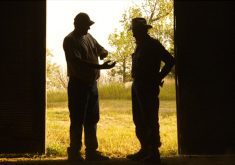Incidents of road rage are up. So are aggressive speeding and dangerous driving. Meanwhile, politicians are receiving death threats, even in rural municipalities, and we see so much lashing out at one another on social media.
Is incivility rampant in our society today? It can certainly feel that way. What happened to the good manners and the poise that Canadians are known for?
Author Jay Remer laments this loss of civility. In his book, The 6 Pillars of Civility, he asks, “How did we devolve into this divisive, unjust and fearful state?”
Read Also

‘No agenda, no attenda’: How to professionalize your family farm meetings
Establishing meeting ground rules can help a farm family find ways to communicate that work for the business and the family.
Noting that people seem lost and overwhelmed, Remer says, “we seem to have slipped into an abyss where we have lost our shared humanity.”
CG reached out to Remer, an etiquette expert from St. Andrews, New Brunswick, to better understand what’s needed to restore the civility that keeps things running smoothly in our homes, on our farms and in our communities.
Remer says recent advances in brain science help explain what’s behind this decline in civility, which he defines as “that system for successfully interacting with others with (a) mutual respect and kindness that helps us get along.”
Feeling safe and secure is a basic human need and a keystone of civility, explains Remer. When we feel secure, we naturally connect more readily than when we are frightened. But when events like the pandemic heighten problems already present in our society and disrupt our feelings of safety, the primitive part of our brain that scientists refer to as our “lizard brain,” takes over, and we revert to the fight, flight or freeze responses designed to keep us alive.
“It’s this culture of fear that is tearing our society to shreds,” Remer says.
This loss of civility comes at enormous financial and personal costs. A lack of civility and bullying in the workplace reduces morale. It means there’s less collaboration, and that more unhappy employees are looking to move to new jobs elsewhere.
The loss of productivity and inability to retain top talent represent a huge cost for businesses.
More civility would also result in lower personal stress levels because healthy connections are what make our lives fulfilling and enjoyable. We would be better citizens, too, says Remer, who notes that we’d also be less prone to extreme political views.
Fortunately, Remer sees a growing appetite for a return to civility. And he has some powerful advice on how to get started: “Our best shot at breathing some new life into the civility we seek is to create that change within ourselves.”
[RELATED] Good, clean fun. The man behind #andyclean
Based on his 40 years of experience working with people and through self-reflection, he wrote his book as a guide to the six pillars of civility. These six include awareness, compassion, humility, gratitude, encouragement and responsibility.
While each of these principles is important, Remer says awareness and compassion are the most crucial of them all.
Remer defines awareness as being mindful of the people and things around us, especially our effect on one another. “Most people don’t consider that,” he says.
We can better understand our impact on others by taking time for ourselves and by using that time for self-reflection and to regain our balance, explains Remer. He likens it to the flight attendant telling the airplane passengers to put on their own oxygen masks before they try to help others.
Taking this quiet time helps us to identify our emotions, separate facts from feelings, and regulate our emotions. Ask yourself: why am I behaving this way?
We have to make time and space for that self-conversation, Remer says, because it takes effort to recognize when your lizard brain is engaged and when you’re having an inappropriate reaction.
“The next time you act out in frustration or anger at your child, partner, co-worker or employee, know that you are inflicting damage, creating fear and contributing to their suffering,” says Remer, who adds that it’s not okay to excuse your behaviour by saying “It’s just the way I am.”
We don’t need to invest a lot of time to see the benefits of self-care, continues Remer. Even five minutes of meditation or relaxation breathing exercises can make a difference.
Ensuring we are getting enough sleep can also make a big difference because when we don’t get enough rest, we’re cranky, he adds.
Once we have our own house in order and are more self-aware, Remer says we can help our family, friends and colleagues manage their emotions. This is what psychologists refer to as emotional intelligence.
It’s an essential concept, perhaps especially on farms, because a working knowledge of emotional intelligence is essential if leaders are to lead by example.
Also be aware that you aren’t alone. Schools, for instance, are helping children learn the vital skill of emotion regulation by incorporating meditation breaks into the school day.

Important as awareness is, Remer adds that compassion is equally powerful when it comes to “breaking the cycle that perpetuates a culture of fear.” He explains that “this fundamental principle of civility acknowledges our differences as individuals with respect and humility and without judgment.”
Remer goes even further to say that practising self-compassion is the most important of all. He explains the linkage: “When we have too high expectations for ourselves and do not embrace our own imperfections, we may not be able to have empathy for others either.
“By showing ourselves compassion, we can give great comfort to others by connecting with them compassionately.”
It’s a vital lesson, Remer says. “We must allow ourselves to make mistakes, make apologies, forgive ourselves, move on, and, ideally, avoid repeating the same errors. Having compassion for others and for ourselves allows us to handle our daily challenges and help others with theirs.”
Jay Remer’s civility pointers
1 Center yourself.
Next time you feel stressed, Remer suggests trying the following breathing exercise. Take four long even breaths. You’ll find that a feeling of calm begins to replace the stress. “Then you can start to process rational thoughts and figure stuff out again.”
2 Step away from social media.
“People say things on social media to one another that they wouldn’t say in person,” says Remer, who adds, “the impacts of cyberbullying have been catastrophic.” He says this can “make the world look very grim, so it may be best to step away,” although it can take time and discipline to break the habit of spending hours online.
3 Practise etiquette when shopping.
“Don’t criticize employees for store deficiencies. Berating someone in public is unacceptable and will solve nothing.” Instead, Remer recommends discussing it privately with the store manager. Also, he says it’s rude and disrespectful to talk on your cell phone when interacting with a store employee.
4 Be more aware of others.
“Lend a hand when needed,” says Remer. “Help, wanting nothing in return.” Learn to recognize that when someone shows us common courtesy or politeness, we feel happier.
5 Encourage family, friends, coworkers and everyone in our communities.
Your encouragement really will result in a nurturing, positive and healthy environment, and a productive and happy atmosphere.
6 Show gratitude
Without gratitude, we take everything for granted, says Remer. “Write thank-you notes promptly, within 48 hours of opening a gift or experiencing whatever it is you are thankful for.”
Resources
Find more information on Jay Remer’s book, The 6 Pillars of Civility: Living a balanced life in a chaotic world through the powers of awareness, compassion, humility, gratitude, encouragement, and responsibility, at etiquetteguy.com.
















